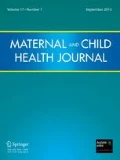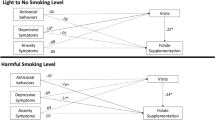Abstract
Objectives: The objective of our study was to determine whether there were combined effects of smoking, alcohol, and illicit drug use during pregnancy on the frequency of preterm births, and if so, the magnitude of the association after adjusting for confounding factors.
Methods: We conducted a retrospective cohort study of singleton live births in Kansas City, Missouri from 1990–2002. We defined health compromising behaviors as the use of cigarettes, alcohol, and illicit drugs. The effect of these behaviors on preterm births was considered for each substance individually, and in combination. The rates of preterm births for these groups were calculated. Using logistic regression, adjusted odds ratios were used to estimate the relative risk of preterm births among these groups.
Results: Over 13% of infants born to women who smoked were preterm, compared to 9.6% for non-smokers. Of infants born to women who reported alcohol use, 17.3% were preterm compared to 10.1% for non-drinkers. Smoking and alcohol use in combination was associated with 18.0% preterm births, while alcohol and drug use in combination was associated with 20.8% preterm births. The use of all three substances was associated with 31.4% preterm births.
Conclusion: Women who engaged in health compromising behaviors during pregnancy showed an increased proportion of preterm births compared to those who did not. There is significant interaction between these behaviors leading to higher rates of preterm births than predicted by their additive effects. To decrease preterm births, we must deal with the effects of smoking, drinking, and drug use simultaneously.
Similar content being viewed by others
References
Bartal M. Health effects of tobacco use and exposure. Monaldi Arch Chest Dis 2001;56(6):545–54.
Mallampalli A, Guntupalli KK. Smoking and systemic disease. Med Clin North Am 2004;88(6):1431–51, x.
Das SK. Harmful effects of cigarette smoke. Mol Cell Biochem 2003;253(1–2):159–65.
McGann KP, Spangler JG. Alcohol, tobacco and illicit drug use among women. Prim Care 1997;24(1):113–22.
Andres RL, Day MC. Perinatal complications associated with maternal tobacco use. Semin Neonatal 2000;5:231–41.
Moore ML, Zaccaro DJ. Cigarette smoking, low birth weight, and preterm births in low-income African American women. J Perinatol 2000;3:176–80.
Peacock JL, Blan JM, Anderson HR. Preterm delivery: effects of socioeconomic factors, physiological stress, smoking, alcohol and caffeine. BMJ 1995;311:531–6.
Simpson W. A preliminary report of cigarette smoking and the incidence of prematurity. Am J Obstet Gynecol 1957;73:808–15.
Lumley J. Stopping smoking. Br. J Obstet Gynaecol 1987;94:289–94
Windham GC, et al. Prenatal active or passive tobacco smoke exposure and the risk of preterm delivery or low birth weight. Epidemiol 2000;11(4):427–33.
Wisborg K, Henriken TB, Hedegard M, Secher NJ. Smoking during pregnancy and preterm birth. Br J Obstet Gynecol 1996;103:800–5
Kolas T, Nakling J, Salvesen KA. Smoking during pregnancy increases the risk of preterm births among parous women. Acta Obstet Gynecol Scand; 2000.
Ventura SJ, Martin JA, Taffel S, et al. Advanced report of final natality statistics. 1993 Month Vital Stat Rep 1995;44:1–88.
United States Department of Health and Human Services. 1994 National household survey on drug abuse: Substance abuse and mental health services administration. National Institute of Drug Abuse; 1995
Ventura SJ et al. Trends and variations in smoking during pregnancy and low birth weight: evidence from the birth certificate, 1990–2000. Pediatrics 111:1176–80.
Shiono PH, Klebanoff MA, Rhoads GG. Smoking and drinking during pregnancy. Their effects on preterm birth. JAMA 1986;255:82–4.
Sokol RJ, Delaney-Black V, Nordstrom B. Fetal alcohol spectrum disorder. JAMA 2003;290:2996–9.
McDonald AD, et al. Cigarette, alcohol, and coffee consumption and prematurity. Am J Public Health 1992;82(1):87–90.
Lundsberg LS, Bracken MB, Saftlas AF. Low-to-moderate gestational alcohol use and intrauterine growth retardation, low birth weight and preterm delivery. Ann Epidemiol 7:498–508.
Parazzini F, et al. Moderate alcohol drinking and risk of preterm birth. Eur J Clin Nutr 2003;57:1345–49.
Keller RW Jr, Snyder-Keller A. Prenatal cocaine exposure. Ann NY Acad Sci 2000;909:217–32.
Kliegman RM, Madura D, Kiwi R, Eisenberg I, Yamashita T. Relation of maternal cocaine use to the risks of prematurity and low birth weight. J Pediatr 1994;124(5 Pt 1):751–6.
Okah FA, Cai J, Hoff GL. Term-gestation low birth weight and health compromising behaviors during pregnancy. Obstet Gynecol 2005;105:543–50.
APA Publication Manual (1994) pp. 292–8.
Impact of multiple births on low birthweight — Massachusetts, 1989–1996. Morb Mortal Wkly Rep. 1999;48:289–92.
Conde-Agudelo A, Rosas-Bermudez A, Kafury-Goeta AC. Birth spacing and risk of adverse perinatal outcomes. JAMA 2006;295(15).
Martin JA, et al. Births: Final data for 2002. CDC Nat Vital Stat Rep 2003;52(10)
Valero De Bernabe J, et al. Risk factors for low birth weight: a review. Eur J Obstet Gynecol Reprod Biol 2004;116(1):3–15.
Xiong X, et al. Gestational diabetes mellitus: prevalence, risk factors, maternal and infant outcomes. Int J Gynaecol Obstet 2001;75(3):221–8.
King AC, Epstein AM. Alcohol dose-dependent increases in smoking urge in light smokers. Alcohol Clin Exp Res 2005;29(4):547–52.
Lazzaroni F, et al. Moderate maternal drinking and outcome of pregnancy. Euro J Epidemiol 1993;9(6):599–606.
Kesmodel U, et al. Moderate alcohol intake during pregnancy and the risk of stillbirth and death in the first year of life. Am J Epidemiol 2002;155(4):305–12.
Passaro KT, et al. The effect of maternal drinking before conception and in early pregnancy on infant birthweight. Epidemiology 1996;7:377–83.
Sampson PD, et al. Prenatal alcohol exposure, birthweight, and measures of child size from birth to 14 years. Am J Public Health 1994;84(9):1421–8.
Kuzma JW, Sokol RJ. Maternal drinking behavior and decreased intrauterine growth. Alcohol Clin Exp Res 1982;6:396–402.
Walpole I, et al. Is there a fetal effect with low to moderate alcohol use before or during pregnancy? J Epidemiol Community Health 1990;44:297–301.
Rondo PH, et al. Maternal psychological stress and distress as predictors of low birth weight, prematurity and intrauterine growth retardation. Eur J Clin Nutr 2003;57(2):266–72.
Hedegaard M, et al. Do stressful life events affect duration of gestation and risk of preterm delivery? Epidemiology 1996;7:339–45.
Lobel M, et al. Prenatal maternal stress and prematurity: a prospective study of socioeconomically disadvantaged women. Health Psychol 1992;11:32–40.
Nordentoft M, et al. Intrauterine growth retardation and premature delivery: the influence of maternal smoking and psychosocial factors. Am J Public Health 1996;86:347–54.
Copper RL, et al. The preterm prediction study: maternal stress is associated with spontaneous preterm birth at less than thirty-five weeks’ gestation. Am J Obstet Gynecol 1996;175:1286–92.
Rini CK, et al. Psychological adaptation and birth outcomes: the role of personal resources, stress, and sociocultural context in pregnancy. Health Psychol 1999;18:333–45.
Roeleveld N, et al. Mental retardation associated with parental smoking and alcohol consumption before, during, and after pregnancy. Prev Med 1992;21:110–19.
Tsai J, Floyd RL. Alcohol consumption among women who are pregnant or who might become pregnant - United States, 2002. MMWR 2004;53(50):1178–81.
Pregnancy Risk Assessment Monitoring Surveillance System 2000 Report, U.S. Department of Health and Human Services; 2005.
Author information
Authors and Affiliations
Corresponding author
Rights and permissions
About this article
Cite this article
Dew, P.C., Guillory, V.J., Okah, F.A. et al. The Effect of Health Compromising Behaviors on Preterm Births. Matern Child Health J 11, 227–233 (2007). https://doi.org/10.1007/s10995-006-0164-1
Received:
Accepted:
Published:
Issue Date:
DOI: https://doi.org/10.1007/s10995-006-0164-1




